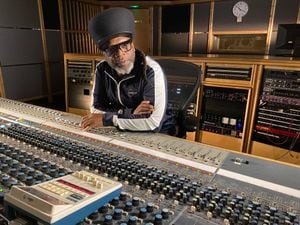Jazzie B: The soul survivor
He was there at the presentation of a Godlike Genius Award to FKA Twigs at the NME Awards. FKA Twigs is, of course, his Goddaughter. Before that, he was hanging out with the Royal Family while helping to raise money for the National Youth Theatre.

Jazzie B, the creator of 1980s/1990s legends Soul II Soul, is the original kid who did well having started out on the wrong side of the tracks. He remains relevant and potent, a man able to fill London’s Royal Albert Hall on a Monday night.
His present UK tour is weaving its way around England, Scotland and Wales and there’ll be appearances through the year. Amidst it all, he has a new book – Reflections Of My Journey – which tells his remarkable story.
Jazzie B’s autobiography is more than just the story of one man, however. It’s a journey into our cultural history. It recounts the racist era in which he grew up and reveals the remarkable way in which he took on the world – and won.
From the mean streets of Camden to being on the front line in Britain’s race wars, from iconic club nights at London’s Africa Centre to winning two Grammy Awards, from releasing an era-defining record – Club Classics Vol. One – to hanging out with James Brown and Barry White, the man born Trevor Beresford Romeo has literally done it all.
He cut his teeth running sound systems and played a street party to coincide with the Queen’s Silver Jubilee in 1977, which inspired his ascent.
The ninth of 10 children, he grew up surrounded by his brothers’ music and was determined to become the best.
His memories of childhood are vivid.
“As a child, I imagined there were people in the radio. I literally thought there were tiny people inside the wooden box. I imagined them working away, connecting all the valves so that the music could play.
“But it wasn’t just the miniature people inside the radio that excited me. Smells also turned me on. When I was growing up, the smells of the radio were evocative. The valve amps and dust gave off a powerful smell that mixed with other aromas in the room, like paraffin heaters and the coal fire.
“The paraffin heaters were wild. They used to reflect light onto the top of the ceiling; it was almost like a slide show and the light from the flames danced above our heads.
“So music and smells, that’s what I remember from the late 1960s and early 1970s when I was growing up.
“The radio was the most important thing. It was at the same height as I was as a toddler, when I was crawling around the house. Music literally surrounded me. I was immersed in it. I could hear it, I could feel it, I could smell it. Music was everything.”
Issues of race were deeply troubling. It was an era of open hostility from whites towards blacks, a sad and depressing time in which the NF was prevalent and violence was just a finger click away.
“When I was coming up, there was the Deptford fire, which killed 13 young black people at a party. A 14th, Anthony Berbeck, died not long after.
“Then there were the race wars; we were getting chased and beaten up all the time by teddy boys. There was no haven. Police were stopping us every day. Literally not a day went by without some racist copper having a word.
“We knew the nooks and crannies, we knew how to escape, so a few of us learned how to duck and dive.
“The older generation saw things differently. They bought into this myth of the Mother Country; they believed in that dream.
“For us, however, it was a dirty reality. The 1970s was the era of the IRA, Rock Against Racism, Enoch Powell. We grew up among some incredible things, some truly incredible things. That melting pot created my dreams.
“That backdrop of working-class Britain, fashion and music, art and opportunity created Soul II Soul.
“My ambition as a kid was to create the biggest sound system in the world. And we actually did. We actually did it.”
As a young DJ, Jazzie would wheel his sound system around the streets of London in a shopping trolley, carting his speakers on the bus on his way to blues parties.
He grew up in the punk era, when the Sex Pistols were inspiring a new generation to believe that they could smash down the barricades and achieve their dreams.
He worked as a tea boy, then became a black pioneer getting a gig in commercial multi-track studios.
He got a job working for Tommy Steele and gradually moved onto market stalls and pressing records. All the while, he was mixing music and fashion, art and culture, as he drove the Soul II Soul projects to new heights.
“There were loads of other great things going on at that time. Parties would have everything from circuses to funfairs. We were at the centre of the world, in the heart of the West End. We were in Covent Garden. Half of the world went to Africa Centre, or so people said.
“It became an icon, just like the Hacienda. You know, everyone in the world claims they were at the Hacienda just like they say about the Africa Centre.
“We did actually go to the Hacienda, back in the day. When we were inside, they bricked up our van. That stuff used to happen. But that was all part of how things were. You lived to fight another day.
“After the Africa Centre, we signed to a major label.”
The next chapter was Club Classics Vol. One. Released in 1989 it was a towering achievement that earned three platinum discus in the UK and two more platinum discs in the USA. It went to number one on the UK chart and the US R’n’B chart while the follow-up, Vol II: 1990 – A New Decade, also earned platinum and gold discs, while giving him his second UK number one record.
“The record became big. It was number one and triple platinum in the UK and number one on the US R’n’B chart. It was double platinum in America.
“Our idea was to keep selling the album as a whole but the singles just took off in club world, where they made a lot of sense.
“It was the whole package. That’s what people bought into. To be honest with you, by that time I was knackered because of the success in America. America, for some weird reason, embraced us.
“It was weird. When that record went gold I don’t think England believed it. And then, after that, it went platinum. And then it went platinum again. And then it went platinum a third time.
“Soul II Soul was always about a collective. We looked at ourselves as being an aeroplane, going from one place to another with all the passengers. So that was everybody from the artists to the producers to writers.
“At the time when Soul II Soul came along, none of us were famous but in our own right, like on the street or wherever we were rolling, we were the dons.
“You know what changed? I’ll tell you what changed. In the early days, trying to get a cab in New York was impossible. It was impossible. They wouldn’t stop for me.
“After Club Classics, I was driving around in my own town car. I went from not being able to get a black cab in London, for love nor money, to having cabs stopping and the drivers saying ‘alright Jazzie’. You know what I mean?
“So there was no regrets from me, in terms of that journey. In terms of what I saw and what I sampled I was happy with where I was.
“I don’t think about the platinum disc, I think about what I had to do to get there. I think about playing a house party in Hackney and getting shut in by some National Front people who threw petrol bombs at the place we played in.
“I think back to the Deptford fire, I had been a teenager when that happened. Those people who died, they were me. We were the same. It was chance that it was them and not me.
“So that’s what I thought of. That’s where I came from.
“You look at being big in America, but then there was Rodney King… That’s the life I led. All I’ve known is that. It’s always been like a warzone. It’s always been hell. And here we are still talking about it.
“Success changed me. Definitely.
“You grow up, it’s that simple. You can now have fish and chips, Kentucky Fried Chicken or a three-course meal at any one of the carveries. That’s what happens when you’re number one. It’s all out there.
“It’s more about how you cope after. It’s how you survive when you come down from the mountain, rather than your journey on the way up.
“Yes, there’s new experiences and a new way of living.”
Jazzie B’s autobiography is available at www.awaywithmedia.com/buy-books





